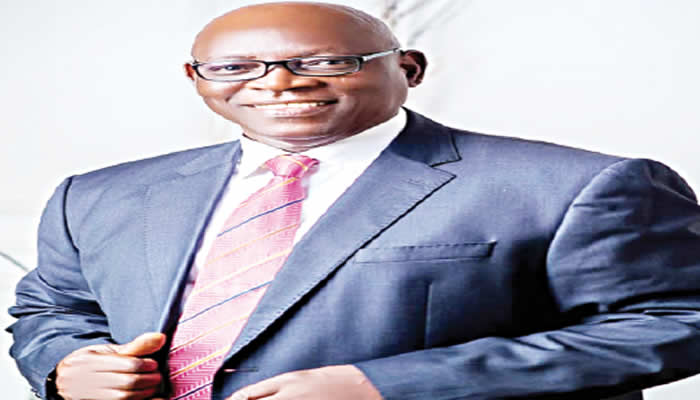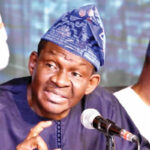
Nick Ezeh is a professor of political economy and an entrepreneur. He is the candidate of the All Progressives Congress for the Enugu West senatorial district. In this interview with RAPHAEL EDE, Ezeh backs part-time legislature and says emphasis should be on production
How do you hope to face the PDP, the ruling party in the state?
I was a member of the PDP for 16 years; I also ran for senatorial primaries in the PDP 2020, and I ran for senatorial office under the Labour Party in 2011. The rest is history. You can check the records. Today I’m in the APC; the PDP is one party, Labour is one party, APGA is one party, and the APC is the amalgamation of all political parties. So that makes the APC stronger, better, and bigger. Again, the structure of the APC in Enugu State is not in doubt. We are lucky to have a person (Ugo Agballah) who is a mobiliser, an energiser, and a workaholic as the state chairman. And the structures of the party are intact. Nobody has left the APC in Enugu State for another party; rather, people leave other parties. So we have structures and substructures in the APC. I personally have structures; you know I have been around town as national director of support groups, civil society, and diaspora for the presidential campaign of PDP 2015.
I’m a mobiliser; political administration is what I teach, and how to make it cheaper is also what I teach. So I have a structure
It is a matter of record that the APC, your party, did not score up to 20 percent of votes in 2015, 2019—even in the senatorial election in Enugu West, it didn’t score up five percent of votes. That shows this party is not popular in this part of the country. How do you intend to navigate that? Secondly, are you campaigning based on the achievements of the APC at the federal level, and to what extent do you think the achievements of APC at the federal level will help you win this election?
You know, in 1979, we held elections in Nigeria; the NPP won the entire South Eastern Zone because of ZIK. In 1983, we held elections here in Enugu State, where the incumbent, Jim Nwobodo, lost to C. C. Onoh of NPN. We have also had elections, and Enugu State has remained a one party state. That’s why no meaningful development is going on. The president has never come to this state to inaugurate any project, nor has anybody come to this state to say a bigger project has been commissioned.
Now, in terms of ability to defeat the PDP, it is very simple. We all lived in Enugu. Very few people go to vote. In fact, elections will happen in the next four days. Today the results are written and that is why it seems they are winning. There is new electoral reform, new electoral laws; my people called me and said, “Come and represent us.” I didn’t buy it; I didn’t fight for it. The new electoral reform means that everybody’s vote will count, and when everybody’s vote counts, if you go to steal ballot boxes, you are wasting time because the election is in the air, in the cloud. You cannot see the election result; it’s in the cloud. So with that, it makes it easier for genuine politicians to win elections, and we are going to win the elections. The record of 20 per cent and 10 per cent in the previous elections is a matter that has been discussed often, and how people sold and bought these percentages doesn’t really reflect the stand of the people.
Now you said that the way the Federal Government has treated the South East, every state produces one minister; every state has one governor and deputy governor, every state has an equal number of members in their apportioned House of Representatives. What we are saying is that because we are at the corner, we are not at the centre and our people who went to the centre are too individualistic that they begin to look for their own welfare; they forget about the welfare of the state. That is why it appears that we were so marginalised in terms of the distribution of certain amenities. I can tell you it’s not true; if you go as a senator and you go on an oversight, there are budgets that are made, and if you want to help your people, you stick to the ground that the right thing should be done.
You once said that Enugu West was the least developed senatorial zone, which sounds like an indictment of the current senator, Ike Ekweremadu. What do you intend to bring on board if elected senator? Secondly, there are institutions in the district that are obsolete; how will you work to ensure they are revitalised; like the School of Health Technology, Oji River, the Federal Cooperative College in Oji-River, and Oghe Cashew Plantation, and many others?
Concerning the institutions and the performance of former senators, we are not here to discuss or score anybody. However, what I will say is that between some of us, training differs, exposure differs, and capacity differs; so everybody is bringing his own to the table, and whatever you can present is what you have, what you don’t have you cannot present. Maybe somebody said we have the best performing senator in the Senate. Yes, at the Senate, we have one of the smartest senators, but that has not resulted in the development of the senatorial district. I beg to challenge anybody to point to the other side of it.
However, all these obsolete institutions and industries are what is driving other parts of the country; go to the West; there is no waste; they have bitumen; they use it. We have coal here; we don’t use it, and we have agriculture; we don’t use it. I personally invested money in the Ministry of Agriculture in Enugu State to rehabilitate the Oghe Cashew Plantation; it’s on record that I spent money. They gave it to somebody, and then the person came, and I invested. The problem we have is that when you have people implementing reforms and they themselves have not been reformed to implement the reformation process, you are not going anywhere with your reforms. So you have civil servants in Enugu who are still working for the old Eastern Region or working for the old Anambra state; that’s the problem; nothing moves. So we need to reform our people.
In Nigeria, we have an issue with debt, and we are looking for ways of cutting the cost of governance. What’s your view? Do you support the part time legislature? Secondly, what’s your take on the issue of restructuring? And we want to know your solution for insecurity and how legislation can be used to address it in the South East?
First, on part-time legislation, yes; in developed countries, representation is part-time. If you want to go to the Senate, you must have a profession; you must have what you do; you must have a means of livelihood so that when you go to represent your people, it should not be a full-time occupation; it’s not a job, it is representation; it should be part time. I will support that. Remember when I ran in the election in 2011? Then, I proposed scrapping the federal allocation. My view is that people who call the family together and share money every month will never ever develop; you don’t share money. But it didn’t work because there are so many excuses. I don’t know how much allocation M. I. Okpara, Akanu Ibiam, and the rest got in the South East, but that’s a matter for another day. So I will support part-time legislation so that people will be paid allowances. Senators and representatives, including councillors, should be paid sitting allowances. If you know you don’t have the resources to do that, you quit.
Then, on the issue of restructuring, you know that the word, the phrase, in Nigeria is not what it is. Russia, the former Soviet Union, restructured, they left; America restructured, they came together; and Germany restructured, they came together between East and Western Germany. The truth is, you are going to restructure something that does not exist.
In one of my papers in Europe, I wrote about the democratisation of the United Nations, and I opined, ten years ago, that if we failed to democratise the United Nations, the time would come when UN resolutions would be based on paper, nobody would obey them, and that would be the end of the United Nations. It’s happening today.
So restructuring: I was born an Igbo man; I have never sworn an affidavit to become a Nigerian, but we are Nigerians by amalgamation, and because we are Nigerians, we accepted; our fathers accepted. So when you are restructured, you move from one region to another, from one state to another. You are talking about restructuring, and you are there creating more autonomous communities in our villages, separating families by autonomous communities instead of uniting them. So these are issues that call for proper examination, and I believe that everybody will support what is workable and what is doable, including restructuring and adjustment of the constitution. Also, I remember the issue of derivation; I was a rapporteur, and I told President Olusegun Obasanjo, “Baba, why don’t you allow people to hold 100 per cent. I said allow the oil-producing communities 100 per cent of their oil; you can tax them; by the time you put the tax together, including green energy and all that, the tax will be about 82 per cent, and they will go home with the remaining per cent, but they have 100 percent.” He pondered over it, but he had no time.
On insecurity, you see that security has become a global phenomenon; it is a threat to people all over the world. I held the first security summit in Enugu about this time last year; I organised it; I was the national vice chairman of the police community relations committee; I’m in charge of the South East; and we held the first security summit because at that point our security men were under serious attack and everybody was afraid. If the security personnel leave the road, in the next minute, criminals will take over, and we don’t know who these criminals are. So we met, and people talked and discussed. Security is something you must discuss at all levels.









